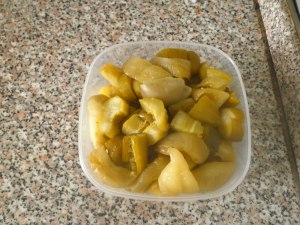Botulism isn’t always pruno-related, the most common source of botulism in North America is improperly canned home preserves. Usually the illnesses are from low acid foods being placed into a jar and then heating enough to seal – but not enough to inactivate the C. botulinum spores.  In 2012, a few unlucky folks attending a Oregon family gathering ate some beets that had been boiling-water-bathed, reaching just 212F instead of the needed 240F. Sometimes, if folks are home fermenting stuff, they can create the exact same conditions. Amarillo News reports that a cluster of four botulism cases were likely caused by an amateur fermenter.
In 2012, a few unlucky folks attending a Oregon family gathering ate some beets that had been boiling-water-bathed, reaching just 212F instead of the needed 240F. Sometimes, if folks are home fermenting stuff, they can create the exact same conditions. Amarillo News reports that a cluster of four botulism cases were likely caused by an amateur fermenter.
The apparent cause of the botulism cases is homemade food called turshi, a traditional Middle Eastern dish of fermented vegetables.
“Investigators believe that during the fermentation phase of preparation lasting several weeks, conditions were ideal for bacteria growth and botulinum toxin production,” according to a news release.
“No commercial food product or restaurant has been linked to the outbreak. No new cases have been added to the outbreak of four and there is no reason to believe this contaminating product is a threat to the general public.”
Health care workers reported the first case Dec. 9, and an investigation found the other victims who knew each other.
Two patients are still in a local hospital.
“One remained on a ventilator this afternoon,” Duke said. “My understanding is it will be removed in the near future.”
